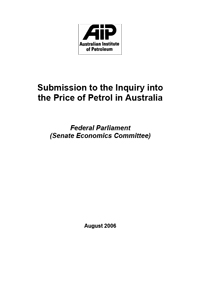AIP Submission to Senate Committee Inquiry into the Price of Petrol in Australia
The Australian Institute of Petroleum (AIP) has lodged a comprehensive submission to the Senate Committee Inquiry into the price of petrol in Australia.
This submission has been prepared to assist the Senate Economics Committee, the community and other interested parties in developing an understanding about petrol pricing in Australia and the international and domestic factors impacting on the level of petrol prices and on their movement over time. An additional focus of the Submission is the influence of competitive pressure and market structure on pricing outcomes in Australia.
Some of the key points in the submission are:
- Australia cannot isolate itself from the global market for petroleum. Crude oil and petroleum products are bought and sold in separate international markets with their prices reflecting the market conditions of the day the same goes for hundreds of other commodities like coal, gold, sugar and beef.
- The global markets for crude oil and petroleum products have a strong regional focus (ie. The Asia-Pacific region in Australia’s case) with prices largely reflecting both regional availability and quality of crude oil and petroleum products.
- While prices in the crude oil and petroleum product markets have been trending upwards for some time it is also clear that unanticipated events like natural disasters (e.g. Hurricane Katrina) and civil unrest and war (e.g. Nigeria and the Middle East) can have a substantial short term impact on international prices and, thereby, on the prices we pay in Australia.
- There is a very close relationship between international prices and the wholesale price of fuel in Australia. This relationship can be easily identified and, contrary to the views of some commentators, major oil companies are not “price gouging”. Refiner margins are not set by the major oil companies. They are merely the difference between international crude oil and product prices.
- The average level of retail prices is largely determined by international markets, while retail price volatility is caused by the structure of the retail market and by local area competition.
- It is well recognised that Australia’s fuel market is highly competitive and, as a result, Australian consumers continue to enjoy among the lowest petrol and diesel prices in the OECD.
- Analysis by the ACCC and others shows that consumers continue to benefit from retail price cycles and from fuels discount programs.
- Although the profitability of the downstream petroleum industry has improved in recent years, returns to Australian refiner-marketers have been below the long term bond rate for most of the last 20 years and well below returns for many other industries in Australia.
- Australian refiners are investing around $2 billion to enable the production of cleaner fuels which will result in significant environmental benefits particularly improvements to air quality.
AIP recognises that current high crude oil and petrol prices are of significant concern to the community. The reliable ongoing supply of transport fuels in Australia is based on enabling the well developed and highly competitive international and Australian fuel markets to work effectively within a stable policy framework. This will ensure a flexible and competitive energy sector into the future based on diversity of energy sources.
AIP strongly advocates a competitive market for fuel and publishes daily pricing information and data on its website to support this. Each of the major oil companies and other organisations (e.g. state motoring bodies and the ACCC) also publish similar pricing information.
Media Contact:
Dr John Tilley
Executive Director, AIP
(02) 6247 3044
Background
AIP was established in 1976 as a non-profit making industry association.
AIP’s mission is to promote and assist in the development of a sustainable, internationally competitive petroleum products industry, operating efficiently, economically and safely, and in harmony with the environment and community standards.
AIP member companies play various roles in each segment of the fuel supply chain. They include the four major (refiner/marketer) oil companies who operate all of the petroleum refineries in Australia and handle a large proportion of the wholesale fuel market. AIP member companies directly operate and control only a relatively limited part of the retail market.
